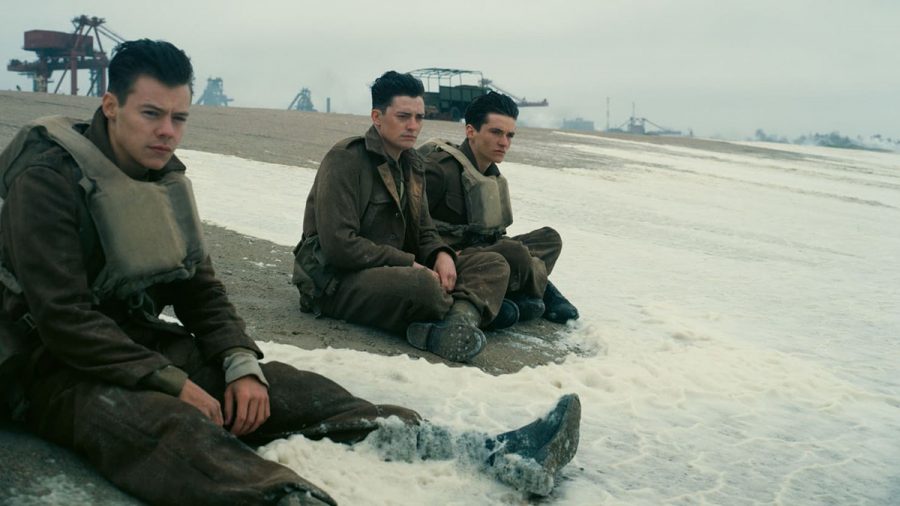‘Dunkirk’: A film preview
The critically acclaimed Christopher Nolan film will be shown at the Woodland Theater this weekend
More stories from Rebecca Mennecke
Photo by Submitted
Harry Styles, former One Direction heartthrob, demonstrates his acting skills as the character “Alex” in the 2017 film.
Featuring the score of music genius, Hans Zimmer, the 2017 film “Dunkirk” has claimed critical success for more than just the fantastic musical score or the inclusion of young heartthrob Harry Styles.
Based on the real-life miracle evacuation of Dunkirk, France during World War II, “Dunkirk” presents an artistic representation of what is now known as the “miracle of Dunkirk.” The movie portrays a historically accurate representation of World War II from an interesting, artistic angle — a thrilling angle that will be portrayed on the screens at the Woodland Theater this weekend.
The film follows a few leading male roles, Tommy and Gibson, and later Alex, played by Styles himself, during the May of 1940 as the Allied troops of Europe sought to flee Dunkirk.
However, with the shallow waters, it was dangerous for large ships to rescue the thousands of soldiers restlessly awaiting the evacuation, before the French-German line of battle was broken, and the European soldiers would have no choice to face the onslaught of German soldiers.
In order to solve the problem of being stuck between the sea and the Germans, the army ingeniously called out for civilian boats to be able to evacuate the soldiers to the deeper tides, where they could be whisked away to other locations to fight in — and to eventually win — the second World War. The evacuation of Dunkirk supposedly gave the Allied troops the hope to bring the war to a closing victory.
Rachel Lewis from Time said the British still use the term “Dunkirk spirit” to refer to “an attitude of being very strong in a difficult situation and refusing to accept defeat.”
The real-life evacuation of Dunkirk remains arguably one of the most influential events during World War II. The film represents this with a mostly satisfying ending, open to the possibility of victory. (No spoilers!)
Though a mostly silent film, the creators articulated the reality of war with few words, as they leave much of the narration to simply be viewed and understood, rather than explained.
This tactic worked for most viewers, as the film averaged a score of 8.6 out of 10 on Rotten Tomatoes.
New York Times film critic Manohla Dargis said, “‘Dunkirk’ is a tour de force of cinematic craft and technique, but one that is unambiguously in the service of a sober, sincere, profoundly moral story that closes the distance between yesterday’s fights and today’s.”
While the film garnered the respect of numerous people, it did not satisfy everyone. David Cox from The Guardian expressed how “Dunkirk” did not include all of the details it could have. The film focused not on the physical armies but more on air combat, left out important details in the evacuation of Dunkirk and eliminated any meaningful characterization and left women almost entirely out of the film.
Cox wrote, “Indeed, I thought the subject would have been better suited to the cold, TV-news glare of digital than the lushness of film.”
UW-Eau Claire students can formulate their own opinions about the film “Dunkirk,” and simultaneously learn about history through an interesting film adaptation, this weekend at the Woodland Theater. The film will be playing at 7 p.m. on Friday, May 4, at 2 p.m. and 7 p.m. on Saturday, May 5 and at 2 p.m. on Sunday, May 6.










